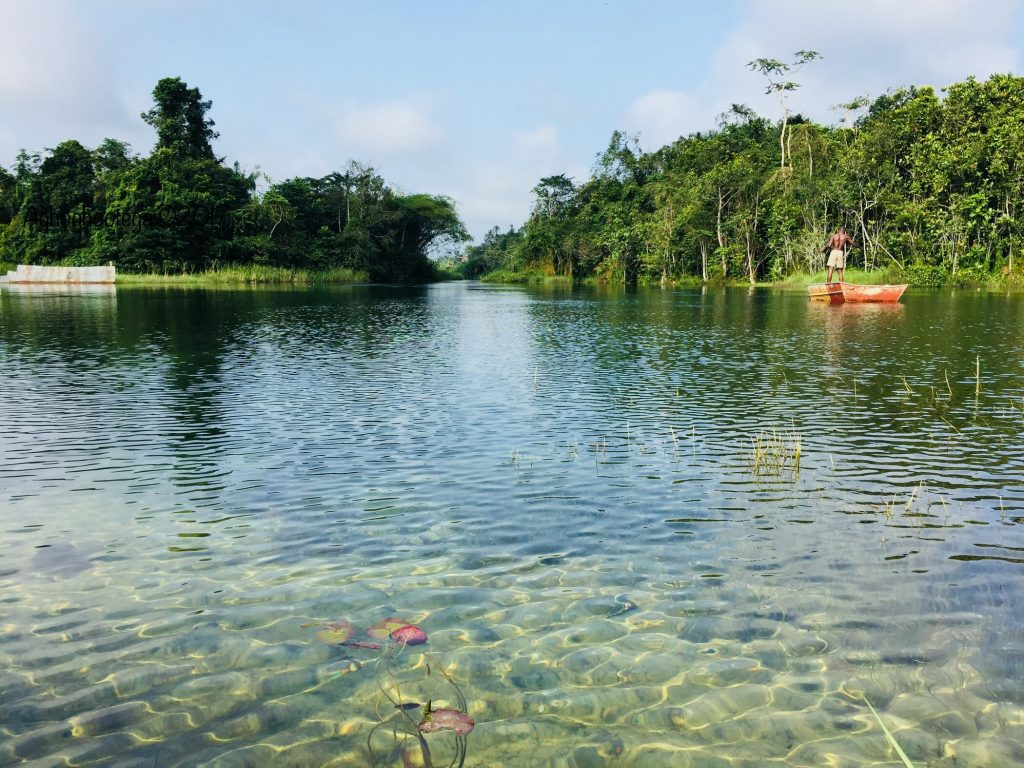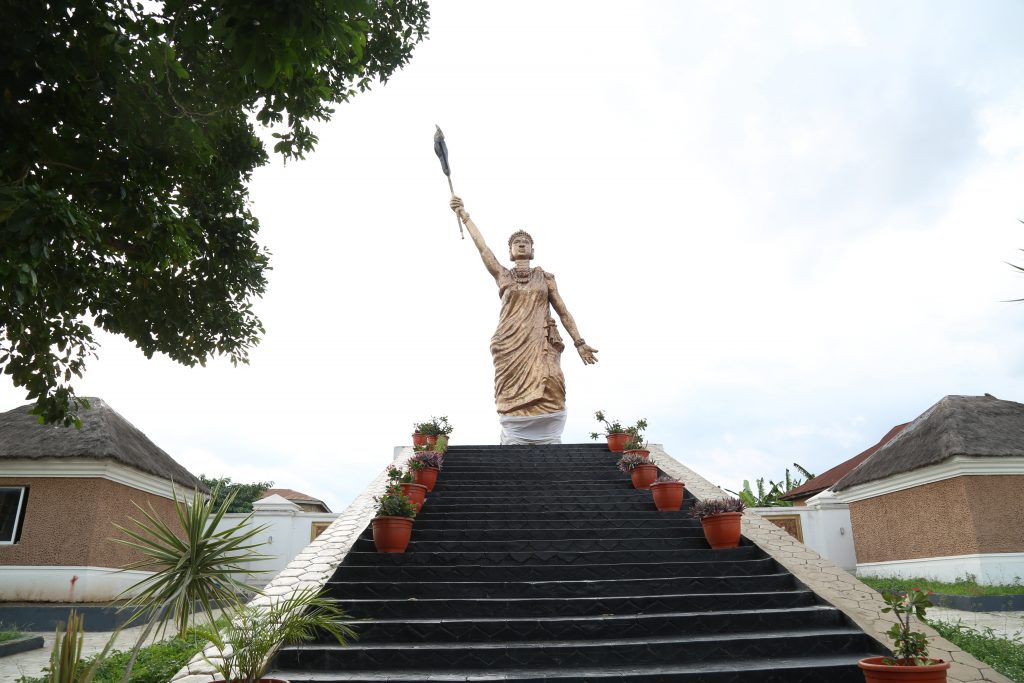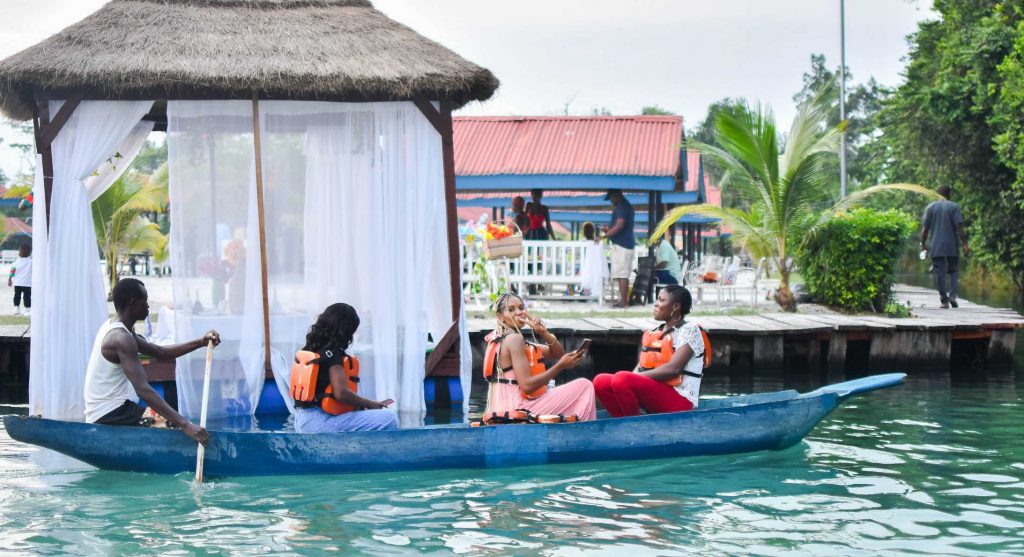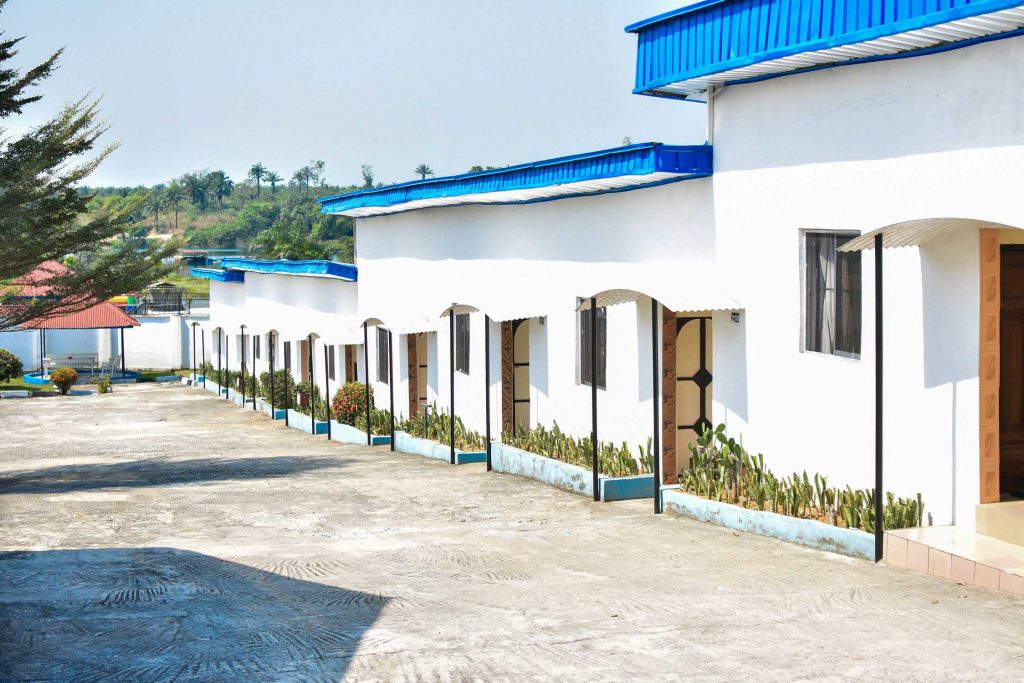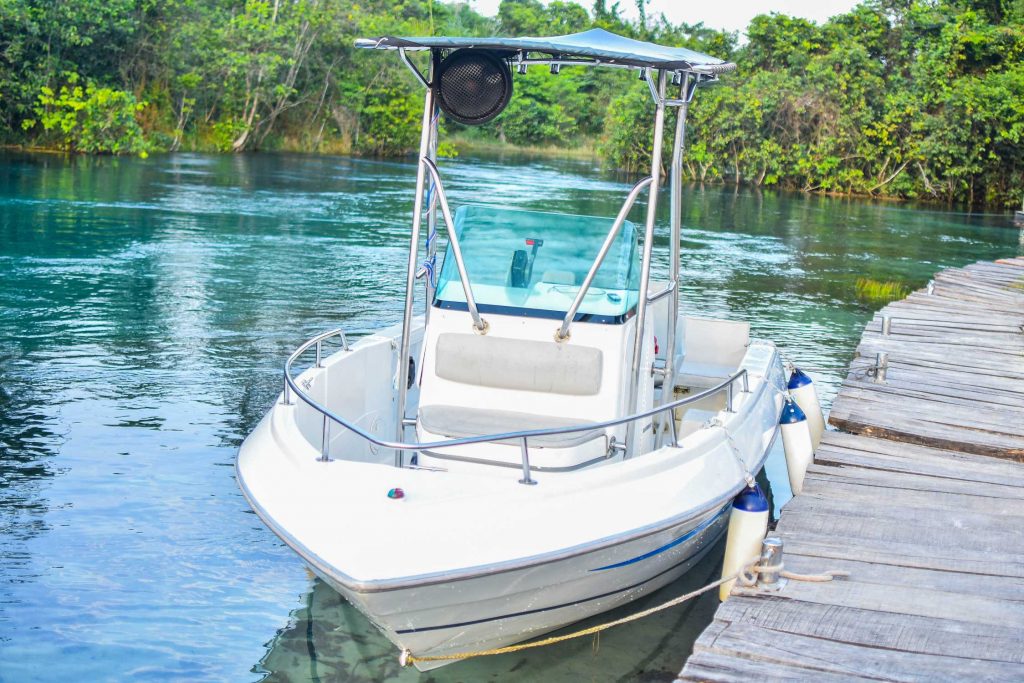Writer Tade visits McCarthy Beach in Abraka, where she finds a place that refreshes her spirit and washes over her like a cloak of relief. She finds that it’s time to explore this huge and enchanting country… starting from its waterways.
By Tade
There are places where nature conspires with tranquillity to offer solace—McCarthy Beach in Abraka, Delta State, is one of them. Here, the sands stretch endlessly in soft ivory waves along the banks of the Ethiope River, a gem tucked away at Gordon Resort. Surrounded by lush, unspoilt vegetation, the setting is an optical delight. The river paints an extraordinary palette of teal, mint, turquoise, and aquamarine—shades not often seen blended so effortlessly. Its fluid spectrum challenges nature’s norms and reminds you that beauty often lies in the unconventional.
History with a Splash of Colour
McCarthy Beach was named in 2007 to honour Sir Charles McCarthy, a British colonial governor who died during the First Anglo-Ashanti war in 1824. Though his historical ties are rooted in Ghana, the beach’s name serves as a commemorative gesture. Today, it has evolved into a beloved destination, especially revered by the people of Abraka, many of whom are reluctant to part ways with its calming presence.
January’s early harmattan wind—mild, dusty, and dry—offered an opportune moment to visit. With New Year festivities winding down, McCarthy Beach became the perfect intersection of serenity and vibrance. Breezy nights beckoned introspection, while the midday heat coaxed both locals and visitors into the river’s cool embrace. This duality—a haven and a playground—defines Abraka’s unique charm.
A Motion Reel of the Journey
Flying was faster, but we chose the road for its rhythm and story. There’s something about watching the Nigerian landscape shift—from one bustling city to the next—that slows time and stirs wonder.
We began in Ile-Ife, Osun State, greeted by the fevered tempo of its Wednesday market—an open-air theatre where buyers and sellers negotiate like seasoned actors. In Ondo City, the thick vegetation blanketing the hills conjured memories of my university ecology lectures. Benin City, Edo State, surprised us with its relative calm and its iconic yellow-and-red buses weaving through the streets. But nothing prepared me for Abraka, where the sight of women confidently manoeuvring motorbikes wasn’t just eye-opening—it was inspiring.
As a child, road travel across South-West Nigeria was a blur of chauffeur-driven trips and polite business exchanges with my father. We never stopped to explore—never a beach, never a break.
“My excitement for travel dwindled over the years as my denial for a vacation intensified.”
I watched others travel via Instagram, longing for places I’d never seen. Then came a message from a friend—an image of McCarthy Beach. She didn’t accept my polite refusal, and thank goodness she didn’t.
Why Travelling in the Low Season Is a Royal Treat
Midweek arrival meant no queues, no competition, just choice. A member of staff at Gordon Resort generously walked us through room options and amenities. We felt like VIPs. Would such consideration exist if we’d arrived on a packed weekend? Perhaps not.
For someone who finds crowds draining, travelling during the off-season was ideal. I relished silent walks through flower-lined paths, meditations under gazebos, and journalling sessions surrounded by vibrant flora. Even the usually chaotic resort lobbies echoed only the occasional whisper of footsteps.
The environment offered a photographer’s dream—no photobombs, just candid moments and scenic architecture. Without crowds, I captured the tiniest details: statues of lions, elephants, and swans; ornamental plants; and perfectly framed memories.
McCarthy Beach is a thriving freshwater ecosystem. During the low season, fewer tourists translate to reduced waste and less disruption of native wildlife. Gordon Resort takes this preservation seriously, integrating environmental sustainability into its hospitality. I even spotted fish like Oreochromis niloticus and Coptodon zillii—species commonly known as Nile and Redbelly Tilapia—gliding gracefully beneath the water’s clear surface. I was tempted to collect samples out of habit, but the sanctity of the place held me back.
The resort’s eco-conscious design complements the landscape. Roads are wide and neatly paved, gazebos welcome the breeze, and lodges are well spaced to ensure privacy. Efficient landscape architecture reduces the need for artificial cooling. Walking paths double as botanical trails and connect visitors to monuments and local art. Vehicle access is limited in certain areas to preserve the natural balance and reduce emissions.
My Aquatic Adventure & Bucket List Moments
The highlight? An early morning boat cruise on the Ethiope River. Fellow travellers had insisted on an 8 a.m. departure, and they were right. A thin mist cloaked the water, giving the impression of stepping into a dream. As the sun ascended, it transformed the atmosphere—dullness gave way to brilliance, and the water dazzled like a sheet of shattered emerald and sapphire.
The cruise glided past mangroves and low-hanging canopies, all reflecting back the river’s changing hues. The scenery was so naturally stylish, it felt like couture from Mother Nature herself. I stayed ashore during canoeing, but a striking image of a woman expertly navigating her canoe remains etched in my mind. She was grace and grit in motion—a true highlight.
One regret: I didn’t swim. Sensitive skin held me back, but watching others splash freely was a balm to the spirit. Children, too, had a designated safe pool, ensuring everyone could enjoy the water.
Community, Creativity & Sustainable Tourism
One of my most heartening experiences was meeting local entrepreneurs who turned creativity into commerce. A group of young people had crafted a business around immersive experiences—floral picnic sets, floating beds, bamboo structures, costume rentals, and photography. Each member had a role, from operations to creative direction. Together, they provided tailor-made moments for guests and embodied the power of local innovation.
I also met Lawson—a globetrotter whose international adventures never severed his bond with home. His love for Abraka was evident. In his words, “You can go far, but your roots always call you back.” It’s a sentiment I now understand.

